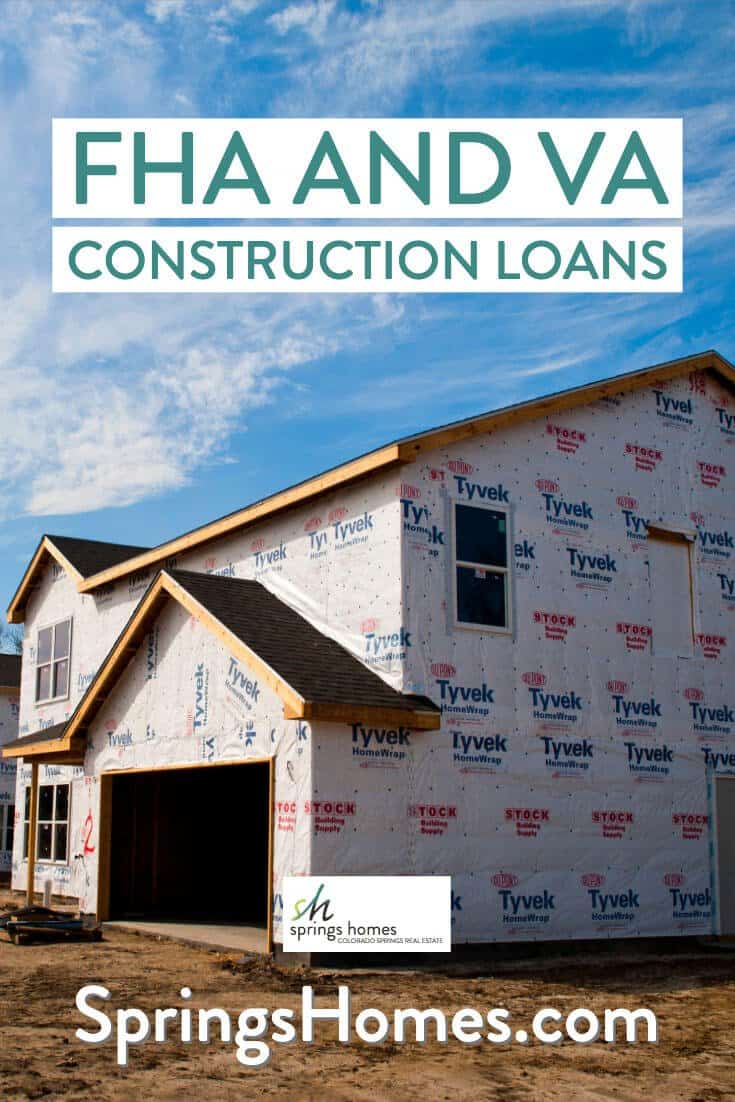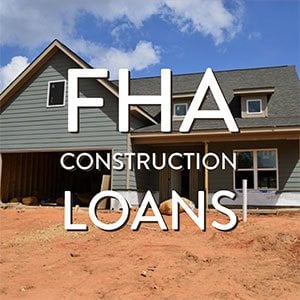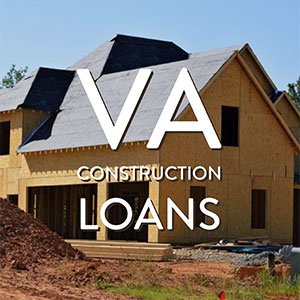
Finding your dream home can be a challenge. For this reason, many people turn to the option of building their own home, from the ground up. Learn about the FHA and VA Construction Loans and if they are right for you.
In many ways, it seems like an ideal scenario. You buy the land, and then get started on the build –you can design your house exactly as you choose, with specific details that you’d like to include. It’s a great way to have your house built according to your standards.
But for most people, paying all-cash for the cost of constructing a home is out of the question. With the average cost of a new-build currently running $296,119 nationally and much higher in many markets. it’s easy to see why it’s out of reach for many.
This is where a home construction loan comes in.
While conventional construction loans are a popular option, using a government-backed mortgage is another route that’s available for some applicants. Two of the most popular options include FHA and VA construction loans. For those who qualify, these loans offer certain terms that make them more appealing than their conventional counterparts –for instance, they have lower down payment requirements and in some cases, better interest rates.
If you’re thinking of building your own home, these loans may be worth considering.
Let’s look at each of them now:

FHA Construction Loans
First up, we have FHA Construction Loans. These loans are a popular option for many first-time buyers, and it’s easy to see why. With far more relaxed lending requirements –such as a lower down payment and lower credit score, they seem like an ideal choice for some. And can allow you to borrow more –relevant to your income, than most other loans.
But it’s important to note that there can be a downside to FHA loans. The lower down payment means higher risk, which means you’ll have to factor monthly mortgage insurance (PMI) into your repayments –something that can easily add .5% to 1% of the cost of your loan. Then there’s the fact that there’s no guarantee that you’ll be approved, and even if you are –a lower credit score could mean less favorable lending conditions.
Generally, the consensus is that FHA loans usually cost more over the life of the loan –all things being equal. However, for those whose only option to becoming a homeowner is through the FHA loan, then these loans certainly present a viable option.
If you’re on the fence about financing, don’t rule out other options just yet. Make sure you’ve done your research, and always shop around as loan terms and rates will vary considerably from lender to lender.
FHA Construction loans do have a single close loan option that has become very popular.
Note: In order to apply for an FHA construction loan, you’ll need to go through an FHA-approved lender. You’ll find these at HUD.gov.
Once you’ve done your research, and found that an FHA construction loan is the best option for you, here’s a look at the next steps you’ll want to take:
Getting Ready for an FHA Construction Loan

- Check Your Credit Score
Before you start drawing up plans, you’ll want to check your credit score. Ideally, you’ll want to order this from all three credit bureaus: Equifax, Experian, and TransUnion. Check to see what your score is, and make sure everything is correct. Also, look to obtain your FICO credit scores from at least one of these bureaus as well.
- Get Your Paperwork Ready
The lender will want to see proof of income, employment, or two years of IRS tax returns if you’re self-employed. They’ll also want to see bank accounts, 401(k) funds, and other assets that you have. In most cases, you’ll want to compile everything before you start looking for a loan, but it may be a good idea to visit the bank to get a list of everything that you’ll need if you’re not sure where to begin.
- Determine How Much You Can Afford
How much home can you afford? Keep in mind that custom homes can run between $100 and $400 per-square-foot, according to HomeAdvisor. You’ll want to get a rough idea of how much your home will cost to build, and whether you’ll be able to afford the loan repayments on top of your other recurring expenses.
- Get Prequalified
Finally, it’s always a good idea to get prequalified upfront. This will save you from spending time and money on blueprints, only to find out later that you can’t afford the loan or that your credit score is too low. Remember to leave some time for this, as financing for construction loans tends to take longer to secure than a traditional mortgage. Lenders will also want to review your debt-to-income ratio.

VA Construction Loans
VA loans are a tremendously popular option. In fact, in the first quarter of 2019, 8% of home purchases were made with a VA loan.
VA loans are open to military members and their families only as the name suggests. These loans require the applicant to have had military experience, either current or prior and an honorable discharge –or a surviving spouse.
There are a number of reasons that VA loans are an attractive loan product. For one, these loans have no down payment requirements. They also offer lower interest rates. Finally, there are no penalties for paying off the loan early. Additionally, these loans don’t require monthly mortgage insurance (PMI), something that can add at least .5% to the cost of a loan.
While current limits to these loans apply, new changes are expected to take place in 2020. Under the new guidelines, if the Veteran has full entitlement, there will be no limit on the loan amount. This, along with the fact that there are no down payment requirements for this loan will make this an especially attractive option.
VA One-Time Close Construction Loans vs. Two-Time Close Construction Loans
It’s important to note that a VA construction loan will be affected by lender’s standards –and certain restrictions may apply. So as always, it pays to shop around with different lenders to find the best deal.
When it comes to VA construction loans, there are two main options, a VA Two-Time Close Construction Loan, and, more recently, something that’s known as a VA One Time Close Construction Loan.
The one-time construction loan offers the best aspects of VA financing, like no money down –while also eliminating the redundancy and hassle of having to close a second time as is the case for a two-time close construction loan.
Learn more about these two loans here.

Who is Eligible for VA One-Time Close Construction Loan?
As is the case with any VA loan, the borrower must be a qualifying member of the U.S. military, a veteran, or a surviving spouse.
Other requirements include:
- The borrower must obtain a Certificate of Eligibility from the VA
- The borrower cannot perform any of the work (It must be done through an approved contractor)
- The builder must be able to provide a one-year VA Builder’s warranty
- The general contractor must be registered with the VA
- The general contractor must carry sufficient insurance
- Periodic inspections of the property during different stages of construction must take place
- The borrower must have 620 minimum FICO score (in most cases)
There are a number of different loan products available to suit different needs. And while VA construction and FHA construction loans offer some key benefits over other loans, it’s important to keep in mind that there are other options available too. Some experts even suggest that conventional mortgages have some key benefits over FHA loans. Be sure to weigh all of your options carefully, and don’t be afraid to look into different loan products to see which one is best for you.
At the end of the day remember, while building your own home can be tremendously rewarding, the process itself is unlikely to be entirely stress-free. Construction projects always end up with unexpected surprises along the way, so always leave some room in your plans for contingencies –and don’t budget to spend the entirety of the loan. Leaving a margin gives you something to work with, and will keep you from a tremendous amount of stress should something end up costing more than anticipated.
